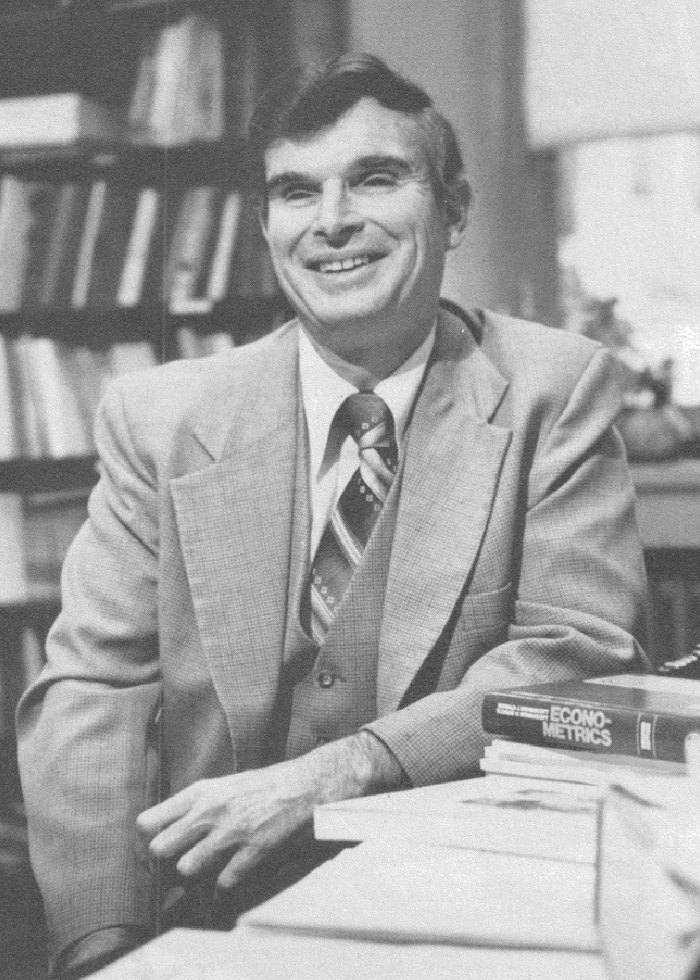Teacher, mentor, trustee Daniel Sisler dies at 87
By Matt Hayes

Daniel G. Sisler, Ph.D. ’62, the Liberty Hyde Bailey Professor Emeritus of Agricultural Economics and a Cornell trustee emeritus, died Nov. 23 in Ithaca. He was 87.
A celebrated teacher and agricultural economist who suffered an injury at age 25 while serving in the military that left him permanently blind, Sisler taught more than 12,000 students during his tenure at the College of Agriculture and Life Sciences (CALS) from 1961-95.
“Dan was a person of such intelligence, fortitude, optimism and sheer willpower that he couldn’t help but spark in his students and colleagues an identical drive to persevere,” said Kathryn Boor, the Ronald P. Lynch Dean of CALS. “Dan inspired generations of Cornellians to accomplish much more than each thought he or she could ever do.”
Born Sept. 25, 1929, Sisler grew up on a family farm that produced potatoes and other crops 25 miles southeast of Buffalo. As a teenager he took an interest in the family’s logging operations, selling timber to furniture makers and nearby companies like toy manufacturer Fisher-Price.
That early experience in the wood industry inspired Sisler to pursue training as a chemist specializing in wood adhesives for the pulp and plywood industries. He enrolled at Purdue University with a football scholarship at the Big Ten school.
After three years at Purdue, as the Cold War intensified, he took a leave of absence to enlist in the Air Force. There he became a survival and rescue specialist in an elite unit trained to parachute into mountainous areas and the Arctic to rescue pilots shot down in enemy territory. In 1952 he served in Korea before returning to the U.S. to teach survival techniques to aircraft crews.
An explosion during a training mission in March 1954 left Sisler blind in both eyes. After extensive rehabilitation in Chicago, he resumed his studies at Purdue in the summer of 1956. He recognized that his disability would impede a career in the physical sciences and so, after earning his bachelor’s degree, turned his focus to agricultural economics. After finishing his master’s degree in that field at Purdue in 1958 he joined Cornell, where his doctoral thesis on U.S. agricultural policy won him an outstanding dissertation award in 1962 from the American Agricultural Economics Association.
With many students in the early 1960s returning to school following Peace Corps service in developing countries in East Africa and Southeast Asia, Sisler shifted his research interests to economic development. For the rest of his career much of his work focused on world hunger and nutrition. Part of Sisler’s research focused on the impacts agricultural production has on the nutritional status of households in Africa and Asia.
“Dan truly was committed to addressing global issues of food insecurity and malnutrition and encouraged cross-disciplinary work,” said Jan Low, M.S. ’85, Ph.D. ’94. Low was Sisler’s 76th and final doctoral advisee.
“Dan believed in students undertaking field research, even when getting funds for such work was difficult,” Low said. “When someone supports you as much as Dan did, it helps you push on through the tough times trying to finish as you cannot imagine telling him you are going to give up.”
It was under Sisler’s mentorship that Low first learned about vitamin A deficiency. Her subsequent work encouraging millions of Africans to adopt biofortified sweet potatoes rich in beta carotene earned her this year’s World Food Prize.
Low commended her mentor for his dedication to his graduate students as well as to the thousands of undergraduates who enrolled in his classes.
During the final year of his doctorate in 1961 Sisler took over teaching Economics of Agricultural Geography. With Sisler at the helm, the course swelled in popularity, regularly drawing more than 600 students and requiring his lectures to be broadcast to two nearby classrooms from an auditorium at Warren Hall.
CALS Dean Emeritus David Call remarked that in addition to being a great teacher and trainer of graduate students, Sisler provided leadership to Cornell as a faculty-elected trustee and to the world at large through his service in numerous nonprofit organizations dealing with food and health. Sisler served on the Cornell Board of Trustees from 1979-84 and on the executive committee from 1982-84. He served as chairman of the general committee of the Cornell Graduate School from 1979-82, and in 1979 he also began to serve on the board of trustees at Helen Keller International, including as chairman from 1994-2006. In 2007, he earned the organization’s Spirit of Helen Keller Award for his work alleviating blindness, especially in underresourced countries and communities.
“Dan was an incomparable teacher and human being,” Call said about his friend and colleague. “He possessed a limitless capacity to connect with students, alumni and peers. His death is a profound loss for the Cornell community.”
As an associate professor, Sisler won the college’s 1964 Professor of Merit Award recognizing excellence in undergraduate teaching. He accrued many other awards for his teaching, including the SUNY Chancellor’s Award for Excellence in Teaching, 1975; the Distinguished Teaching Award from the American Agricultural Economics Association, 1978; and the Distinguished Educator Award from the Council for the Advancement and Support of Education, 1985.
He is survived by his widow, Carol, and two sons. A public memorial service will be held Dec. 10 at 11 a.m. at Kendal at Ithaca.
Matt Hayes is managing editor and social media officer for the College of Agriculture and Life Sciences.
Media Contact
Get Cornell news delivered right to your inbox.
Subscribe